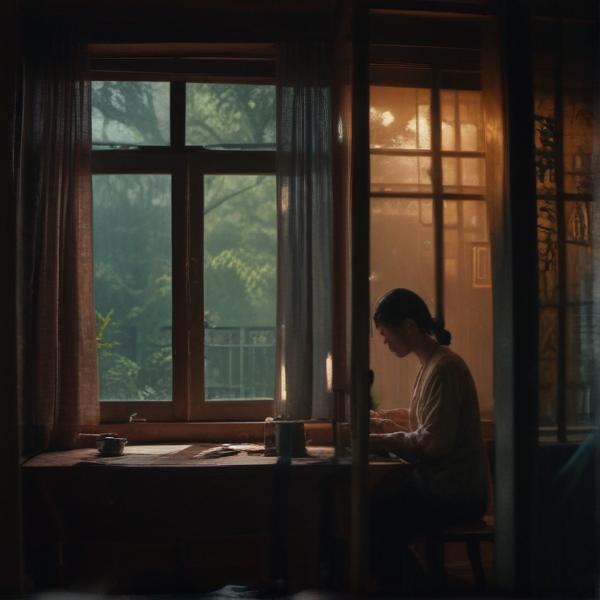基本信息 (Basic Information)
含义与用法 (Meanings & Usage)
中文核心释义 (Core Chinese Meaning): 使人快乐、娱乐;使愉快。
英文核心释义 (Core English Meaning): to amuse, to entertain; to make happy
“娱”通常用作动词,表示使人高兴、娱乐,常见于“娱乐”、“娱乐圈”、“娱人”等词汇。现代口语中较少单独使用,多见于书面语或复合词。
'娱' is typically used as a verb meaning to entertain or amuse, and is commonly seen in compound words such as '娱乐' (entertainment), '娱乐圈' (the entertainment industry), and '娱人' (to amuse others). Rarely used alone in spoken language; more common in written or formal contexts.
象形意义 / 为何这么写 (Pictographic Meaning / Writing Rationale)
“娱”字左边为“女”,表示与女性有关,右边为“吁”,表示呼气、叹息之声。整体结构体现以女性的方式(如唱歌、跳舞)来取悦、娱乐他人。The left part of '娱' is '女' (woman), indicating a connection with females, and the right part is '吁', representing breath or sighing sounds. The structure reflects entertainment or pleasing others through means often associated with women like singing and dancing.
文言文释义 (Classical Chinese Meaning)
与现代意义相近,常指使人快乐、娱乐。Similar to modern meaning, generally referring to entertaining or making someone happy.
深入学习 (In-depth Study)
字源故事 (Origin Story)
“娱”最早由“女”和“吁”组成,本义是使人心情愉快。古人认为女子善于用言语和歌舞来娱乐他人,因此造字时用“女”作偏旁,体现愉悦、欢乐之意。The character '娱' is originally composed of '女' (woman) and '吁' (a sound or to exhale), meaning to make someone happy. In ancient times, women were considered adept at entertaining others through words and dance, so '女' was used as a radical to signify joy and delight.
字形演变 (Character Evolution)
甲骨文 (Oracle Bone Script):
甲骨文中无专门‘娱’字,多用与娱乐、歌舞相关的字表达类似意思。
There was no specific character for '娱' in Oracle Bone Script; related concepts were expressed with characters about entertainment and dance.
金文 (Bronze Inscription):
金文时期出现“娱”字的早期形态,由“女”和“吁”组合而成,字形较为写实且结构松散。
The Bronze Inscription era saw early forms of '娱', a combination of '女' and '吁', with a more pictorial and loosely structured character.
小篆 (Small Seal Script):
小篆中“娱”字结构规整,左右分明,‘女’与‘吁’部件清晰可辨。
In Small Seal Script, '娱' became more regular in structure, with '女' and '吁' components distinctly separated.
隶书 (Clerical Script):
隶书中的“娱”字笔画变平直,结构更加扁平,便于书写。
'娱' in Clerical Script has flatter strokes and a more horizontal, easier-to-write structure.
楷书 (现代) (Regular Script (Modern)):
现代楷书“娱”,左右结构,左为“女”表示与女性有关,右为“吁”表示声音或叹气,暗含使人心情愉快之意。
In modern Regular Script, '娱' has a left-right structure: '女' on the left suggests a connection to women, while '吁' on the right relates to exhaling or sound, alluding to bringing happiness.
常用词语和例句 (Common Words & Examples)
娱乐 (entertainment; amusement)
周末我喜欢看电影作为娱乐。
Eng: I like watching movies as a form of entertainment on weekends.
娱乐圈 (entertainment industry; showbiz)
他梦想进入娱乐圈成为演员。
Eng: He dreams of entering the entertainment industry to become an actor.
相关成语 (Related Idioms)
相关成语信息待补充。Related idiom information pending.
多语言翻译 (核心释义) (Translations (Core Meaning))
- French: divertir, amuser
- German: unterhalten, amüsieren
- Spanish: entretener, divertir
- Italian: intrattenere, divertire
- Portuguese: entreter, divertir
- Russian: развлекать, веселить
- Arabic: يُسلّي، يُرفّه
- Persian: سرگرم کردن، شادی بخشیدن
- Dutch: vermaken, amuseren
- Polish: zabawiać, rozrywać
- Vietnamese: giải trí, làm vui
- Ukrainian: розважати, веселити
视频学习资源 (Video Learning Resources)
通过以下链接在热门视频网站搜索 "娱" 的更多讲解:
Search for more explanations of "娱" on popular video sites:
- 在 Bilibili.com 搜索 "娱 字源 说文解字" (Search on Bilibili)
- 在 YouTube.com 搜索 "娱 character origin etymology" (Search on YouTube)
网络参考 (Web References for "娱") ()
网络搜索信息待获取。Web search information pending.
更多图片 (娱 More Images) ()
